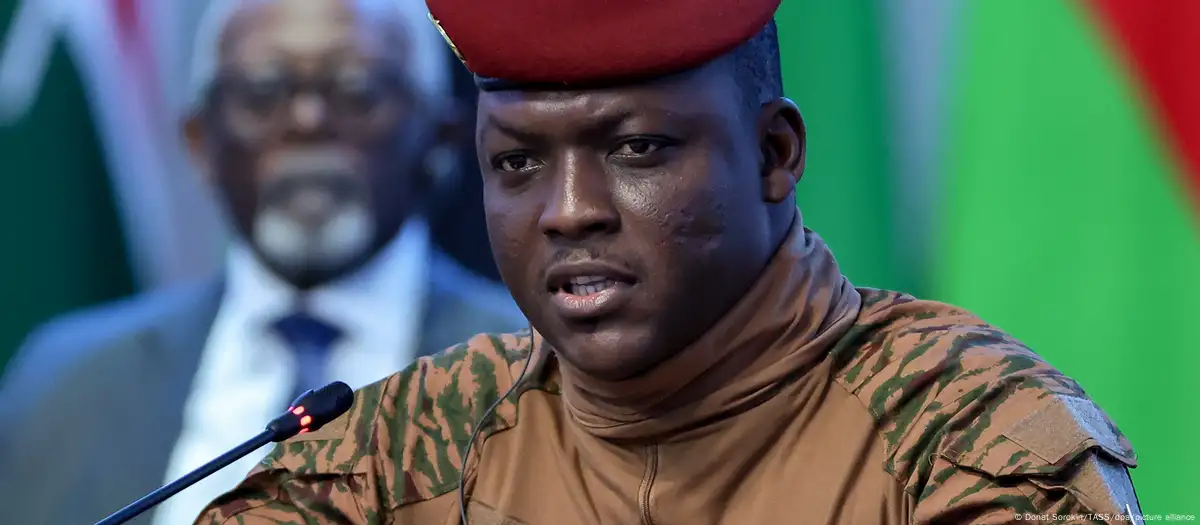Burkina Faso’s government vowed a decisive response after over 200 were killed in the Barsalogho terror attack. Interim President Traore has made fighting terrorism a top priority.
“In this backlash, we will make sure that the enemy knows that we will never again accept such barbarity on our territory,” Burkina Faso’s security minister Mahamadou Sana said in a state television broadcast. “In any case, we want to assure the Burkinabe people that we are committed to protecting the Burkinabe and their property and will stand firm,” Sana promised.
Jama’at Nusrat al-Islam wal-Muslimin (JNIM), an affiliate of al-Qaeda in the Sahel claimed responsibility for the terrorist attack on a village in central Burkina Faso during the weekend, in which at least 200 villagers and soldiers were killed.
Sana added the government has directed medical and humanitarian assistance to all those affected and that authorities are committed to protecting lives.
Burkina Faso’s junta-led government under Interim President Ibrahim Traore, who came to power in a coup in September 2022, promised to make the fight against terrorism a top priority.
Burkina Faso battered by Islamist violence
“According to a video that has been circulating, which lasts just under a minute, dozens of bodies can be counted in a trench,” Wassin Nasr, a Sahel specialist and senior research fellow at the Soufan Center security think tank told DW. “Bodies of men dressed in civilian clothes with shovels and shoes but no weapons. We understood that these were people who had been requisitioned to dig trenches for the army and the Volunteers for the Defence of the Fatherland (VDP).”
Nasr went on to say that JNIM fighters invaded the area and opened fire. The attack is said to have lasted almost eight hours, according to reports on social networks. Regional observers described it as one of the deadliest attacks this year in the West African nation.
Collecting blood for the wounded
According to a hospital source in Kaya, more than 100 injured people are being treated in the city’s largest hospital after the attack. “In Barsalogho, we’ve set up a system to ensure the care, evacuation, and triage of the injured,” Mohamed Poda, regional director for health in north-central Burkina Faso, told DW.
“We have also set up a unit at the university hospital in Kaya to ensure that all patients are treated free of charge, that additional examinations are carried out, and that the urgent injured are evacuated to Ouagadougou.”
A government team consisting of the minister of security, the minister of humanitarian aid and the government spokesperson traveled to the scene to express solidarity with the grieving families and the injured.
Anger and fear amongst Burkinabe
So far, the government has released no official figures for the number of dead and wounded nor any details on the perpetrators of the massacre. The Collectif Justice pour Barsalogho, a civilian-led advocacy group, says it is outraged by the negligence that led to the mass slaughter. “We are shocked by the attitude of the government,” a statement by the newly formed group sent to DW stated.
“They are not showing any real compassion or moral support commensurate with the shock felt by the martyred families of Barsalogho.”
The group is calling on the government and President Traore, to declare those killed martyrs of the nation. They are also urging the public to observe one week of mourning.
Many residents are scared, keeping a low profile for fear of reprisal. Jonas (not his real name) described an atmosphere of mistrust. “If you call a relative in Barsalogho, it turns out that he is either an accomplice or not. So, when the military investigates and checks the calls and if it turns out that you had to reach someone, you are systematically considered to be their accomplice,” he told DW, adding that the situation was difficult. “I have many acquaintances in Barsalogho who I no longer call.” According to Jonas, it has become impossible to leave Barsalogho for Kaya without an escort.
Leaving with frequent attacks
Nearly half of Burkina Faso is outside of government control. Since 2015, Burkina Faso has been regularly hit by attacks by jihadist groups, in which more than 20,000 civilians and soldiers have been killed, according to the NGO Armed Conflict Location and Event Data Project (Acled).
“At the moment, attacks in Burkina Faso are recurrent in several parts of the country. Not a day goes by without an explosive attack, an attack on an army base, an attack on the VDP, and this is all part of it,” Nasr said.
The violence contributed to two coups in 2022. The military junta promised to end the attacks but has struggled, even after seeking new security partnerships with Russia and other junta-led, conflict-hit countries in Africa’s Sahel region.
Burkina Faso’s junta leader Traore has also requested civilians to assist the military in security efforts. A civilian task force, Volunteers for the Defence of the Fatherland (VDP), is already working closely with the military.
Jihadist violence in the country is increasing due to a lack of efficient air cover and intelligence by security forces, according to Nasr. Ineffective control of areas bordering Mali and Niger, two countries also struggling with violent attacks, make the fight against terrorism even more challenging. Nasr says human rights abuses committed by the country’s security forces and VDP have also led more people to join the jihadists.

